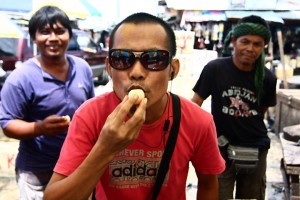
By VINCENT GO
BONGAO, Tawi-tawi – Endangered sea turtle eggs are being harvested in Tawi-tawi seas and sold in the public market of Bongao, despite various laws banning such activities.
Sea turtle eggs are harvested mostly by the Badjaos or Samals, the dominant ethnic group in Tawi-tawi and are being sold in the local market for only P100 for 15 pieces, or P50 for 7 pieces.
Locals believe that sea turtle eggs contain aphrodisiac properties, with some men even attesting to the supposed “virility powers” of eating raw turtle eggs.
The pawikan appears on the list of the Convention on International Trade in Endangered Species of Wild Fauna and Flora (CITES), having become endangered because of poaching, slaughter, blast fishing, illegal trade and pollution.

The Philippines is a signatory of the CITES and implements the Pawikan Conservation Project nationwide through the Protected Areas and Wildlife Bureau (PAWB) of the Department of Environment and Natural Resources (DENR).
Tawi-tawi is the Philippine’s southernmost province, and home to the Turtle Islands, a group of seven islets between the Philippines and Sandakan in Malaysia in the southernmost tip of the country.
The islets are Southeast Asia’s single most important green turtle conservation area and nesting ground of sea turtles and have been declared a protected area and sanctuary of the green turtles (Chelonia mydas).
In 1979, Executive Order 542 created the Task Force Pawikan. In 1982, then Ministry of Natural Resources issued MNR Administrative Order No. 33, giving authority to the Task Force Pawikan (TFP) to regulate egg collection in the Province of Tawi-Tawi.
Nilo Romoso, head of the Pawikan Conservation Project under the Protected Areas and Wildlife Bureau (PAWB), said these laws have been superseded by The Wildlife Conservation Act, or Republic Act No. 9147, which made all commercial selling of sea turtle eggs illegal.
R.A. 9147 penalizes violators with a fine of up to P100,000 and imprisonment of up to one year.
Romoso said that the DENR is aware that the practice still persists in Tawi-tawi, but admits that because of its geographical location, law enforcement is difficult.
“ARMM DENR is in charge of implementing and enforcing these laws,” Romoso said.
